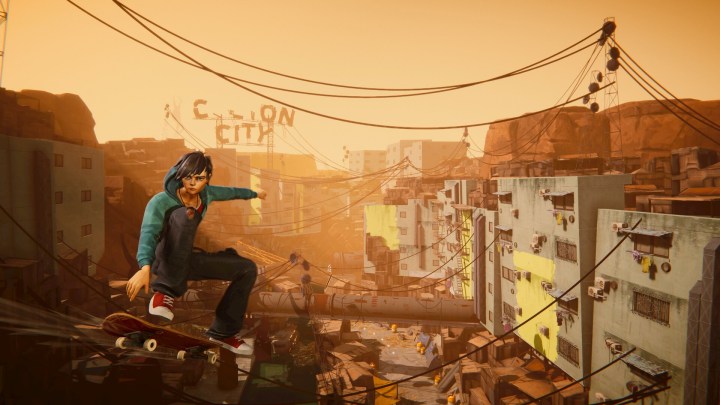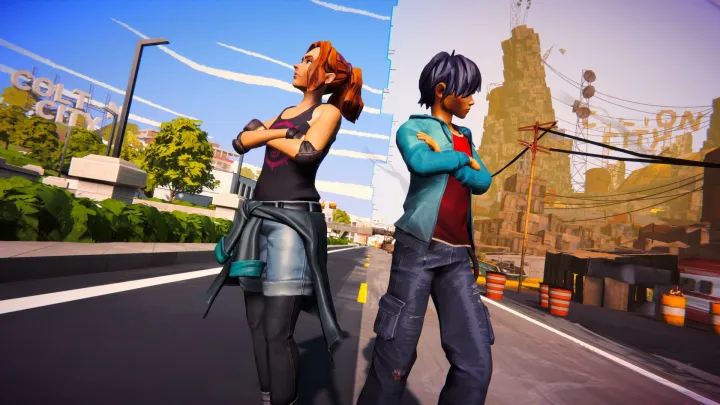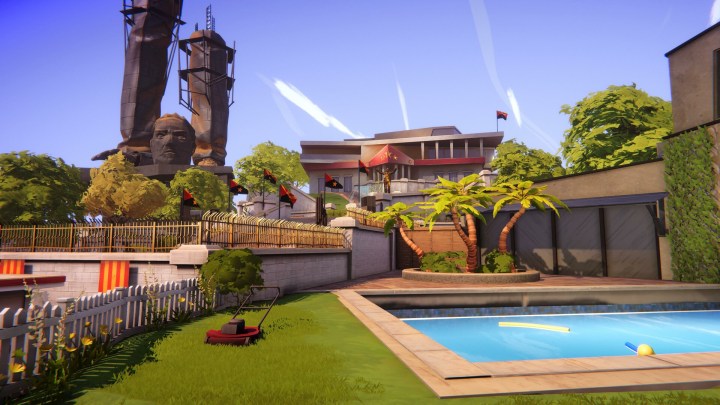Two years after its release, narrative roguelike Road 96 still sticks in my memory. The road-trip drama follows a cast of kids attempting to escape an authoritarian government by hitchhiking across their country’s border. It’s a tense series of vignettes where wrong choices result in shocking teen deaths, a political slasher film where the killer is unchecked fascism. While some of its commentary was left a bit underexplored, it delivered an unmistakable message about youths fighting oppressive power systems.
Its new prequel, Road 96: Mile 0, isn’t quite so confident. Rather than expanding on its predecessor’s creative genre experiment, developer DigixArt takes a total left turn with a more linear adventure filled with psychedelic musical sequences. It’s Sayonara Wild Hearts reimagined as a political thriller. What it does keep intact, though, is its “choose your adventure” gameplay hooks, as players shape how its two young heroes see the world through their actions.
That decision finds the unusual prequel trapped in something of a pitfall. DigixArt’s attempt to create something more nuanced backfires here, resulting in a comparatively vague political drama that’s too careful to be meaningful. It’s a reminder that creating art with a strong belief system isn’t about pandering to one side of the aisle; it’s paramount to telling a clear and impactful story.
Challenge your beliefs
Road 96: Mile 0 is set before the events of its predecessor, further exploring the rise of its fictional dystopia. The story follows Zoe and Kaito, two friends living in the sheltered community of White Sands who have very different views of the world. Zoe is a privileged daughter of a government worker living in a fancy part of town, while Kaito resides in the slums with his working-class parents. The core narrative hook is that both characters are forced to challenge their beliefs as they learn some hard truths about White Sands.
It’s split up into two distinct gameplay loops. The main hook is its musical interludes, which have the duo playing out some story conflict through trippy sequences. In one, Zoe tries to escape her overprotective security detail by skating around obstacles to the beat of a rebellious Offspring song. It’s a larger-than-life sequence where she skates up the side of a skyscraper as the secret service agent tries to grab her like King Kong. There are 10 scenes in total, all of which offer exciting and visually distinct set pieces that are more “fun” than anything the series has done yet.

Though I enjoy those sequences on a pure gameplay level, they don’t have much function thematically. Only one or two digs at any of the game’s political ideas, with characters grappling with the government’s lies through a surreal musical nightmare. Otherwise, it’s a random bit of gamification (there’s even a high score component that serves no real function other than replay potential) that doesn’t mesh with the choice-driven nature of the series.
The bulk of the thematic work happens in more traditional first-person exploration segments, with Zoe and Kaito walking through a few set locations in White Sands. In those parts, we learn more about the authoritarian regime running the town and make dialogue choices that determine where the characters land on the political spectrum. Zoe’s story carries some potential initially, following someone who is forced to question a skewed version of the world that’s been normalized to her since birth – especially as she learns Kaito may be involved with a “terrorist” group looking to destroy those power systems.
That’s where the game’s politics get murky.
Both sides
The choices presented in Mile 0 aren’t particularly compelling. Zoe only ever gets binary options in conversations: She can either totally rebel against power or remain foolishly oblivious to it. There’s no in between, which makes the idea of flipping between the two feel ridiculous. I just ended up picking all the rebellious options every time, as there was never a moment where staying loyal to authority would feel consistent with her journey. Choices don’t make much of a difference either. Each one pushes Zoe and Kaito to the left or right of a spectrum, which seemingly doesn’t impact much outside of the ending.

Perhaps not wanting to punish players into thinking they’d made a “wrong choice,” Mile 0 keeps its political backdrop frustratingly vague. We never really learn anything about the political party running town other than the fact that they’ve established a surveillance state. Their policies are unclear and we never really know who they impact. It’s a bit of an odd choice when the story draws some pretty on-the-nose parallels to Donald Trump via its not-so-subtle President Tyrak.
Many will probably assume it’s a right-wing dictatorship, but the lack of details leaves it feeling like a purposefully vague Rorschach test to avoid too much controversy. For instance, its Fox News-adjacent media empire is named GNN, giving right-leaning audiences room to read it as a “mainstream left-wing media” critique. You’ll likely end up projecting your own assumptions onto its fictional political party based on what you despise in real life (it’s worth noting that DigixArt isn’t an American studio, despite the politics here referencing the Trump era).
In an attempt to construct some difficult moral choices, Mile 0 wades into hollow “both sides” territory. Much of the story revolves around the Black Brigades, an opposition group looking to take down the government. Zoe’s forced to ponder whether or not the group is righteous in its motives, while Kaito must question if it’s too radical for its own good. But again, we never really get a sense of what the Black Brigades really are. We know for a fact that they’ve been painted in disingenuous ways by government propaganda, but we’re still left to assume the situation might not be black and white.
The conflict almost plays out like a parody of The Last of Us Part II; everything is presented in a moral grayscale that’s never really earned.

The game’s short Steam description includes a phrase that acts as a clear mission statement for the project: “Challenge your beliefs!” But how can one do that in a game that doesn’t present many of its own? Everything is presented in a cartoonish manner that’s too vague for me to have an opinion on. The only way I can begin to make moral choices is by drawing on my own biases and projecting my view of the real world onto it. When I’m deciding if the Black Brigades are trustworthy or not, my mind has to see them through the lens of the Antifa movement for me to have any feelings about their otherwise unclear tactics or philosophies.
Road 96: Mile 0 feels like a total backfire in that regard. Without offering a clear perspective of its own to help orient players, I’m never given a reason to question anything at all; it just reaffirms whatever I already believe. I ended my journey with both Zoe and Kaito’s “belief” bars entirely maxed out towards rebellion, doubling down on my own worldview rather than subverting it. It’s hard to imagine many players naturally coming to a different conclusion when the boogeyman politicians of White Sands are just stand-ins for whoever you don’t like.
Road 96: Mile 0 is out now on PS4, PS5, Xbox Series X/S, Nintendo Switch, and PC.



